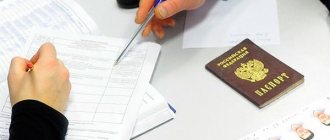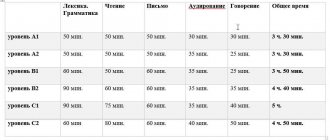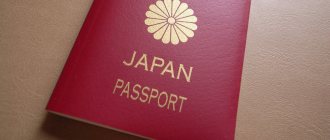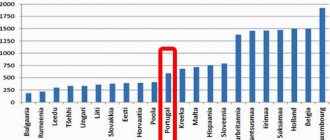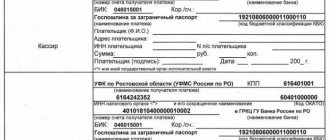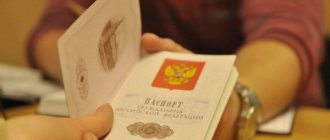Passport of a citizen of the People's Republic of China
August 05, 2015 Category: Reference information Previous article | Next article
Regular and biometric passport of the People's Republic of China
Personal data in the passport of a citizen of the People's Republic of China
(Chinese: 中华人民共和国护照Zhōnghuá Rénmín Gònghéguó hùzhào
), a document issued to Chinese citizens to verify their identity and for traveling abroad. In China, instead of a passport, an identity card is used, which is issued to citizens in accordance with the Law of the People's Republic of China “On Public Identity Cards”.
In accordance with Articles 3-9 of the PRC Passport Law, there are three types of passport:
- regular passport;
- service passport;
- diplomatic passport.
Regular passports
issued to the PRC by the police (immigration control departments); abroad - diplomatic missions, consulates and other foreign missions of the PRC vested with appropriate powers. The validity of an ordinary passport is 5 years (if the passport holder is under 16 years of age) or 10 years (if the passport holder is over 16 years of age).
Diplomatic passports
issued by the Ministry of Foreign Affairs of the People's Republic of China.
Service passports
issued by: 1) Ministry of Foreign Affairs of the People's Republic of China; 2) diplomatic missions, consular offices and other foreign missions of the PRC 3) foreign relations bodies of the people's governments of provinces, autonomous regions, and cities.
Chinese citizens living in Hong Kong or Macau receive a special version of the passport, differing in color.
The passport consists of 48 pages. New versions of the ordinary Chinese passport, "Form 97-2" since 2007, replace the previous versions "Form 92" and "Form 97-1". Since May 15, 2012, Chinese citizens have been receiving biometric passports.
The information in the passport is duplicated in Chinese and English.
- Passport type (P)
- Country code (CHN)
- Passport number (G######## or E########) G-regular passport, E-biometric
- First name (Last name/First name)
- Gender (M) or (F)
- Identification card number (18 digits)
- Date of birth (DD.MM.YYYY)
- Date of issue (DD.MM.YYYY)
- Place of birth (Province)
- Place of issue (Province, or place of diplomatic/consular registration)
- Expiration date (DD.MM.YYYY)
- Owner's signature
- Machine Readable Code
Inscriptions in the passport
In Chinese: 中华人民共和国外交部请各国军政机关对持照人予以通行的便利和必要的协助.
In English The Ministry of Foreign Affairs of the People's Republic of China requests all civil and military authorities of foreign countries to allow the bearer of this passport to pass freely and afford assistance in case of need.
Translation of Chinese documents into Russian
Law of the People's Republic of China "On Passports"
VK
| Acceptance date: | 26.04.2006 |
| Publication date: | 26.04.2006 |
| Effective date: | 01.01.2007 |
| State: | valid |
Official text: 中华人民共和国护照法
Article 1. This Law was adopted for the purpose of legal regulation of the submission of applications, issuance and management of passports of the People's Republic of China (hereinafter referred to as the PRC), ensuring the rights and interests of PRC citizens when crossing the state border of the PRC, and promoting foreign relations.
Article 2. PRC passport is a document certifying the citizenship and identity of a citizen of the PRC when crossing the state border and abroad.
No organization or individual may falsify, modify, transfer, intentionally destroy or illegally retain passports.
Article 3. Passports are divided into ordinary (general civil) passports, diplomatic passports and service passports.
Sample passports are provided for review to foreign governments by the Ministry of Foreign Affairs of the People's Republic of China through diplomatic channels. Article 4 Ordinary passports are issued by the Entry and Exit Administration Office (Immigration Supervision Administration) of the Ministry of Public Security of the People's Republic of China or the entry and exit administration departments of public security organs of local people's governments at least at the county level authorized by the Ministry of Public Security of the People's Republic of China, as well as diplomatic missions and consular offices. institutions of the People's Republic of China abroad and other foreign missions authorized by the Ministry of Foreign Affairs of the People's Republic of China.
Diplomatic passports are issued by the Ministry of Foreign Affairs of the People's Republic of China.
Service passports are issued by the Ministry of Foreign Affairs of the People's Republic of China, diplomatic missions and consular offices of the People's Republic of China abroad and other foreign missions vested with powers by the Ministry of Foreign Affairs of the People's Republic of China, as well as the external relations organs of the people's governments of provinces, autonomous regions, centrally subordinate cities and cities with regional divisions vested powers of the Ministry of Foreign Affairs of the People's Republic of China.
Article 5. When traveling abroad in connection with moving to live in a foreign country, visiting relatives, studying, employment, tourist trip, conducting commercial activities or for any other reason not related to official business, this person applies for extradition an ordinary passport to the entry and exit management department of the public security organ of the local people's government at least at the county level at the place of registration in the house register (hukou, permanent registration).
Article 6 When applying for an ordinary passport, a citizen must submit an identity card, a house register, recently taken photographs without a headdress, as well as relevant materials justifying the purpose of applying. When applying for an ordinary passport for the reasons provided in Article 5 of this Law, government employees are also required to submit relevant supporting documents in accordance with government regulations.
The entry and exit management department of the public security organ is required to issue a regular passport within 15 days from the date of receipt of the application materials; in case of refusal of extradition due to non-compliance with the requirements, it is necessary to explain in writing the reason for the refusal, and also inform the applicant of his right to an administrative review of the decision (appealing the decision in an administrative manner) or going to court in administrative proceedings.
If it is impossible to issue a passport on time in remote territories or areas with inconvenient transport links or due to special reasons, the period for issuing a passport may be extended to 30 days with the permission of the responsible person of the authority issuing passports.
If a citizen requests urgent processing due to a reasonably substantiated urgent reason, the entry and exit management department of the public security organ is required to process the passport in a timely manner.
Article 7 Registration details of a regular passport include: first and last name, gender, date of birth, place of birth of the passport holder, date of issue of the passport, expiration date, place of issue and name of the issuing authority.
Validity of a regular passport: 5 years if the passport holder is under 16 years of age, and 10 years if the passport holder is over 16 years of age.
Detailed rules for issuing ordinary passports are established by the Ministry of Public Security of the People's Republic of China.
Article 8. Diplomatic and consular officers, as well as their spouses, minor children, and diplomatic couriers shall receive diplomatic passports.
Employees working in diplomatic missions, consular offices of the PRC abroad, representative offices of the PRC in the UN, special organizations of the UN system, as well as in other international intergovernmental organizations, their spouses and minor children receive service passports.
In the event of other citizens traveling abroad on official business, in addition to those provided for in the two previous parts, the employing organization, in accordance with the provisions of Parts 2 and 3 of Article 4 of this Law, submits an application to the Ministry of Foreign Affairs, which, depending on the need, issues a diplomatic or service passport.
Article 9 The registration details of a diplomatic or service passport include: first and last name, gender, date of birth, place of birth of the passport holder, date of issue of the passport, expiration date and name of the issuing authority.
The circle of persons to whom diplomatic and service passports are issued, the rules for issuance, validity period, as well as the classification of service passports are determined by the Ministry of Foreign Affairs of the People's Republic of China.
Article 10. In the event of changes in the registration data of the passport holder, it is necessary, on the basis of relevant supporting materials, to apply to the passport issuing authority with an application for making changes.
Article 11. If one of the following circumstances exists, the owner of the passport has the right, in accordance with the rules, to apply for a replacement or reissue of the passport: 1) the expiration of the passport in the near future; 2) free pages for using the passport will soon run out; 3) impossibility of using the passport due to loss; 4) loss or theft of a passport; 5) other circumstances in which there are reasonable grounds for replacing or re-issuing a passport.
When replacing or re-issuing an ordinary passport within the People's Republic of China, the passport holder must contact the entry and exit management department of the public security organ of the local people's government no lower than the county level at the place of registration in the house register; abroad, the passport holder applies to a diplomatic mission, consular office of the People's Republic of China abroad or another foreign mission of the People's Republic of China authorized by the Ministry of Foreign Affairs of the People's Republic of China. When Chinese citizens permanently residing abroad replace or reissue an ordinary passport after returning to the People's Republic of China, the application must be submitted to the entry and exit management department of the public security organ of the local people's government at or above the county level of the place of temporary residence.
Replacement and reissue of diplomatic and service passports are carried out in accordance with the rules established by the Ministry of Foreign Affairs of the People's Republic of China.
Article 12. The passport has functions for visual and machine reading of information.
Protection of passports from counterfeiting is established taking into account state technical standards.
The authority issuing passports and its employees are obliged to keep confidential the citizen’s personal data that became known to them in connection with the production and issuance of the passport.
Article 13 The passport issuing authority shall refuse to issue a passport if one of the following circumstances exists: 1) the applicant is not a citizen of the People's Republic of China; 2) the impossibility of establishing the legal status of the applicant; 3) forgery of documents by the applicant in the process of applying for a passport; 4) the applicant is currently serving a criminal sentence; 5) the people's court notified the applicant of a travel ban until the end of the proceedings in the civil case; 6) the applicant is an accused or suspect in a criminal case; 7) the relevant department of the State Council of the People's Republic of China believes that the applicant's departure may cause significant harm to national security or state interests.
Article 14. If one of the following circumstances exists, the passport issuing authority does not have the right to issue a passport to the applicant for a period of 6 months to 3 years from the date of completion of the sentence or deportation: 1) the applicant was serving a criminal sentence for violating the state border regime; 2) the applicant was deported from a foreign country due to illegal border crossing, illegal residence or illegal employment.
Article 15 People's courts, people's procuratorates, public security organs, state security organs, and administrative control organs have the right, in accordance with the law, to withhold the passport of a person (party to a case) when it is necessary to conduct a case.
If a person (party to the case) refuses to surrender a passport, the state bodies provided for in the previous part have the right to contact the passport issuing body with a request to declare the person’s passport no longer valid.
Article 16 The passport issuing authority shall declare a passport invalid if the holder of the passport loses his or her citizenship of the People's Republic of China, or if the passport is lost or stolen.
Fake, modified or fraudulently obtained passports that have been declared invalid by the passport issuing authority are invalid.
Article 17 If a passport is obtained through forgery, the issuing authority shall confiscate the previously issued passport or declare it invalid, and the public security organ shall impose a fine of 2,000 to 5,000 yuan renminbi; If there is a crime, the guilty person is brought to criminal liability in accordance with the law.
Article 18 In case of providing counterfeit or modified passports to others or selling passports, the guilty person will be held criminally liable in accordance with the law; If there is no corpus delicti for criminal prosecution, the public security organ will confiscate the illegally obtained income and apply arrest for a period of 10 to 15 days, and impose a fine of 2,000 to 5,000 yuan renminbi; The public security agency will confiscate illegal passports and their production equipment.
Article 19 If you cross the state border using a fake or modified passport or another person's passport, the public security organ will apply punishment in accordance with the entry and exit management laws; An illegal passport is confiscated by public security authorities.
Article 20 If an employee of the passport issuing authority commits one of the following actions in the process of issuing passports, disciplinary action will be applied in accordance with the law; if there is a crime, the guilty person in accordance with the law is brought to criminal liability: 1) refusal to accept an application that should be accepted; 2) failure to issue a passport within the legally established period in the absence of a valid reason; 3) collection of fees in excess of the amounts established by the state; 4) solicitation or receipt of a bribe from the applicant; 5) causing harm to the rights and legitimate interests of a citizen as a result of the disclosure of his personal data, which became known in connection with the production and issuance of a passport; 6) other actions constituting abuse of power, negligence, or actions for selfish motives.
Article 21 The Ministry of Public Security of the People's Republic of China determines the form of ordinary passports and controls their production; The Ministry of Foreign Affairs of the People's Republic of China determines the form of diplomatic and service passports and exercises control over their production.
Article 22 Passport issuing authorities have the right to charge fees for the production of a passport and amendments to a passport. Fees for issuing a passport and making changes to a passport are transferred to the state treasury.
The fees for issuing a passport and amending a passport are set and published by the competent pricing department of the State Council of the People's Republic of China together with the competent financial department of the State Council of the People's Republic of China.
Article 23. If it is impossible to use a passport as a result of loss, theft or loss during a short-term trip abroad, a citizen must apply to a diplomatic mission, consular office of the PRC abroad or another foreign mission of the PRC authorized by the Ministry of Foreign Affairs of the PRC with an application for registration travel document.
Article 24. Citizens engaged in cross-border trade, providing or receiving services in the field of cross-border tourism have the right to apply to the entry and exit management department of the public security organ of the local people's government at least at the county level authorized by the Ministry of Public Security of the People's Republic of China to apply for the issuance of a travel document for crossing the border. China.
Article 25. When traveling abroad as a seaman and working abroad on a sea vessel, a citizen is obliged to apply to the maritime administration authority authorized by the Ministry of Transport of the People's Republic of China with an application for the issuance of a seaman's certificate of the People's Republic of China.
Article 26. This Law applies from January 1, 2007. Passports issued before the entry into force of this Law remain valid for the duration of their validity.
Features of Chinese migration laws
The Chinese Nationality Law specifies exactly how to obtain this right as a foreigner. First of all, anyone applying for citizen status in 2021 must live within the country for quite a long time.
Certain categories of the population who live within this country for a certain time, comply with the laws and fall under the stipulated articles of the migration law can also obtain Chinese citizenship.
If a foreigner has a Chinese education, then the chances of obtaining citizenship are quite high, since such a specialist can remain within the state and work with the right to a residence permit. It is almost impossible to obtain citizenship without knowledge of the Chinese language and cultural characteristics. Therefore, students have a very high chance of getting it.
Building of the International University of Economics and Business in Beijing
Foreigners working in the country, speaking Chinese and living for a long time within the country can apply for citizenship.
Chinese legislation is quite conservative, so the status of a citizen can be obtained if the society of this country does not speak negatively about the applicant. This state loves hardworking and non-conflict people, so good recommendations from employers play an important role in the exercise of the right of citizenship.
By right of birth, children born in any province of this state can receive a Chinese passport. Children whose one parent has the status of a full Chinese citizen also receive citizenship. Children born within the state to a family without Chinese status can obtain a citizenship document if their parents do not have another citizenship.
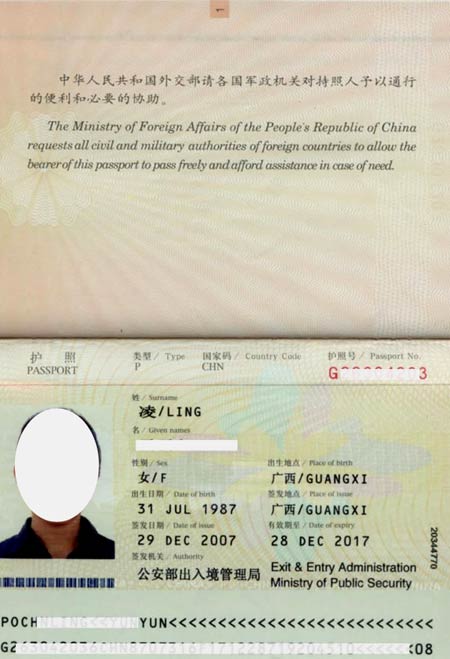
Chinese passport sample
The Chinese are very jealous of family. Therefore, their migration laws include the concept of family reunification. To obtain the right to reside in China under this category, it is necessary that a close relative resides in the territory of the state and has the status of a citizen of the country.
Many people believe that the concepts of citizenship and nationality are very closely intertwined. But Chinese society is diverse, and the country is home to people of different nationalities, all of whom have the right to claim citizenship.
The naturalization process in China is very lengthy and practically impossible for many categories of foreigners. This country is severely overpopulated, so it is not surprising that immigration laws are only getting stricter, not looser.
The following categories of foreigners received the only concessions:
- Businessmen and investors;
- Students, researchers;
- Workers of special rare professions with experience and experience in their narrow field.
Types[edit | edit code]
Several types of passports are issued in China:
- ordinary (“personal ordinary”) passport;
- official passport;
- diplomatic passport;
- passport of the Special Administrative Region, i.e. Macau passport and Hong Kong passport.
New versions of the ordinary Chinese passport, the so-called. "Form 97-2", replacing their previous versions "Form 92" and "Form 97-1", since 2007.
Regular passport - Inside
Passport “Form 97-2” is an ordinary Chinese passport (machine-readable passport, or so-called machine readable passport (MRP)).
Personal data is located under the front cover - a color photograph printed using secret digital technology. Specifically there are:
- Passport type (P)
- Country code (CHN)
- Passport number (Gxxxxxxxx)
- First Name (Last Name and First Name)
- Gender (M) or (F)
- Identification card number (18-digit code), consisting of a six-digit administrative division code[en], an eight-digit date of birth, a three-digit serial number and a check digit
- Date of birth (DD.MMM.YYYY)
- Date of issue (DD.MMM.YYYY)
- Place of birth (Province, or country if born en route)
- Place of issue (Province, or place of diplomatic/consular registration if issued abroad)
- Expiration date (DD.MMM.YYYY)
- Signature
Languages
All information is contained in Chinese and English.
Notes in the passport
In Chinese
中华人民共和国外交部请各国军政机关对持照人予以通行的便利和必要的协助.
In English
The Ministry of Foreign Affairs of the People's Republic of China requests all civil and military authorities of foreign countries to allow the bearer of this passport to pass freely and afford assistance in case of need.
Translation in Russian:
The Ministry of Foreign Affairs of the People's Republic of China requests all military and administrative agencies of foreign countries to ensure freedom of movement and assistance to the passport holder when necessary.
Types
Several types of passports are issued in China:
- ordinary (“personal ordinary”) passport;
- official passport;
- diplomatic passport;
- passport of the Special Administrative Region, i.e. Macau passport and Hong Kong passport.
New versions of the ordinary Chinese passport, the so-called. "Form 97-2", replacing their previous versions "Form 92" and "Form 97-1", since 2007.
Regular passport - Inside
Passport “Form 97-2” is an ordinary Chinese passport (machine-readable passport, or so-called machine readable passport (MRP)).
Personal data is located under the front cover - a color photograph printed using secret digital technology. Specifically there are:
- Passport type (P)
- Country code (CHN)
- Passport number (Gxxxxxxxx)
- First Name (Last Name and First Name)
- Gender (M) or (F)
- Identification card number (18-digit code), consisting of a six-digit administrative division code[en], an eight-digit date of birth, a three-digit serial number and a check digit
- Date of birth (DD.MMM.YYYY)
- Date of issue (DD.MMM.YYYY)
- Place of birth (Province, or country if born en route)
- Place of issue (Province, or place of diplomatic/consular registration if issued abroad)
- Expiration date (DD.MMM.YYYY)
- Signature
Languages
All information is contained in Chinese and English.
Notes in the passport
In Chinese
中华人民共和国外交部请各国军政机关对持照人予以通行的便利和必要的协助.
In English
The Ministry of Foreign Affairs of the People's Republic of China requests all civil and military authorities of foreign countries to allow the bearer of this passport to pass freely and afford assistance in case of need.
Translation in Russian:
The Ministry of Foreign Affairs of the People's Republic of China requests all military and administrative agencies of foreign countries to ensure freedom of movement and assistance to the passport holder when necessary.
What data does the China ID card contain?
Let's look at the front side. Two lines of large characters mean "People's Republic of China" as well as "Resident Identity Card".
Also on the front side is the name of the authority that issued the certificate and the validity period. As in Russia, the validity period of an identity document depends on age. 46 issues a “long-term” certificate, the validity of which is unlimited.
Let's move on to the back side. Here, on the right side, is a color photo of the owner. The first line of text contains the citizen's first and last name. In China, the surname is written first and usually consists of one character.
Next is the gender, which can be male (男) or female (女). The same line indicates the ethnicity of the citizen. Even though there are more than 56 ethnic groups in China, more than 90% of the time this will be Han. The third line contains the date of birth in Year-Month-Day format.
The fourth column indicates the registration address. Often it does not coincide with the residential address, since many Chinese citizens travel far from their homes in search of work.
The final line is a unique identification number. This number is assigned at birth and accompanies a person throughout his life, regardless of changes in documents. Moreover, it's not just 18 random numbers. Knowing how the code is deciphered, you get a lot of information about the person: his age, gender and place of birth, accurate to the administrative district.


